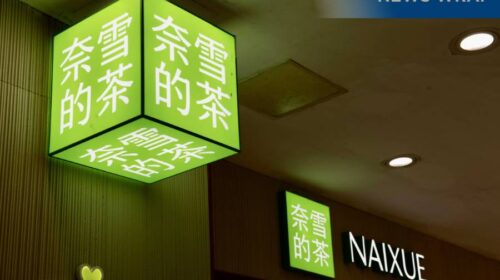Mixue brews up renewed IPO bid, tempting investors with overseas expansion

After an aborted attempt to list on China’s domestic A-share market, the country’s leading bubble tea chain has filed a new IPO application for Hong Kong
Key Takeaways:
- Mixue has filed to list in Hong Kong, in a deal that could value it at $5 billion or more as it reportedly seeks to raise up to $1 billion
- An increasingly crowded China market is pushing Mixue to accelerate its global expansion, with the company currently operating about 4,000 stores overseas
By Hugh Chen
If your bubble bursts the first time, then you try again. That’s the new signal coming from Mixue Group, China’s largest bubble tea chain by store count, which is attempting to list in Hong Kong after its previous IPO attempt in 2022 on China’s domestic A-share market fell flat.
Mixue is looking to raise $500 million to $1 billion in its IPO, according to a Reuters report last week, which cited a source with direct knowledge of the matter. A sale of 10% of its shares at the bottom of that range would value the company at a sizable $5 billion – nearly seven times the value of Nayuki (2150.HK), the only other Hong Kong-listed company from China’s bubble tea sector.
As leader of China’s massive bubble tea market, Mixue’s size and brand recognition should help it find strong investor appetite. The company is immensely popular among consumers, boasting tens of thousands of its compact, mostly takeout-only stores sporting its trademark snowman logo.
Mixue’s rapid rise since its founding in 1997 owes largely to two strategic approaches. The first is its franchised business model, which enabled its rapid expansion by leveraging third-party operators. Of Mixue’s more than 36,000 stores at the end of last September, over 99.8% were run by franchisees, according to its prospectus filed with the Hong Kong Stock Exchange last week.
Mixue’s focus on franchising contrasts sharply with many of its rivals that focused on direct store ownership, though many are now experimenting with franchising as well. The company generates most of its revenue by supplying its huge store network with the materials and equipment they need to produce tea drinks and ice cream, unlike competitors that sell directly to consumers.
Its approach has enabled Mixue to rapidly expand while avoiding many of the fixed costs, such as rent, salaries and equipment purchases, associated with direct store ownership.
The other key contributor to Mixue’s success has been its laser focus on the less exotic lower end of the market – aiming for the younger, more budget-conscious crowd in China’s smaller cities. The company’s tea products generally sell for less than 10 yuan, or about $1.40, according to the prospectus.
Mixue’s network is far larger than its closest competitors in China’s market for bubble teas costing less than 10 yuan. As of November, Tianlala and Yihetang – the nation’s second and third largest chains, respectively – operated approximately 5,676 and 4,735 stores within China, according to a December research note from China International Capital (CICC).
Following its recent rapid growth, Mixue recorded 15.4 billion yuan ($2.17 billion) in revenues during the first nine months of last year, more than the 13.6 billion yuan for all of 2022 and 10 billion yuan for 2021. Net profit for the latest nine-month period was 2.4 billion yuan, with a relatively strong gross profit margin of about 30%, underscoring the benefits of Mixue’s asset-light franchised business model.
Overseas expansion
As China’s bubble tea market becomes increasingly saturated, Mixue is one of the country’s major chains looking to soak up new business by expanding overseas.
According to data cited in the December CICC research report, growth of China’s bubble tea market is projected to slow after several years of rapid expansion. The market is expected to increase 20% this year to 304.3 billion yuan, but that rate will decelerate to 16% by 2027, according to the CICC report. A wildcard could also be China’s slowing economy, which is prompting consumers to rein in their spending on less essential items.
Competition in the market has also intensified substantially, with about 20 major brands currently operating in the domestic market, according to the CICC report.
Mixue is facing competition from two directions. Many of its competitors at the higher end of the market have lowered their prices, increasingly encroaching on Mixue’s traditional turf. A sort “tea war” broke out as early as 2022 when leading premium brand HeyTea dropped its prices by 3 yuan to 7 yuan, leading Nayuki to promise to roll out more products below 20 yuan. Such pressures will only increase with the growing consumer caution.
Mixue is also facing pressure as more brands experiment with franchising to grow more quickly. HeyTea started opening franchised stores in November 2022 after previously insisting on operating all its stores directly to maintain its image and quality. Rivals Lelecha and Nayuki followed suit last year by saying they would look for similar partners.
Adoption of franchised stores has helped those rivals, many focused on the higher end of the market, expand into smaller cities that are Mixue’s traditional stronghold.
Seeking relief from China’s overheated market, Mixue moved overseas by opening its first foreign store in Vietnam in 2018. Since then its overseas store count has grown to about 4,000 as of last September. Most of those stores are located in Southeast Asia, a region popular with many Chinese consumer brands due to its many similarities with the China market.
According to third-party research cited in Mixue’s prospectus, the market size of freshly-made tea drinks in Southeast Asia is expected to reach $49.4 billion by 2027, more than double the estimated $20.1 billion in 2023.
While overseas markets hold big potential, Mixue’s global expansion will still face significant challenges. A key one will be localization to conform with each country’s customer preferences and operating environments.
The company’s success in China owes largely to its established national supply network to serve its thousands of domestic stores. Mixue currently supplies its overseas stores mostly using its China facilities, though its next logical step would be to build local facilities in key markets – a step that would require major new investment.
The company is also eying less-familiar destinations, announcing plans last year to enter Australia. Such markets could offer new challenges since they share fewer cultural similarities with China. What’s more, coffee is far more popular in such Western markets than tea.
And as Mixue expands, it will quickly discover many of its local rivals are having similar thoughts. Among those, HeyTea and Nayuki have also been very active in Southeast Asia. Still, Mixue’s low pricing strategy may help it to find an audience abroad, especially as inflation leads global consumers to become more value-conscious.
Have a great investment idea but don’t know how to spread the word? We can help! Contact us for more details.
The Bamboo Works offers a wide-ranging mix of coverage on U.S.- and Hong Kong-listed Chinese companies, including some sponsored content. For additional queries, including questions on individual articles, please contact us by clicking here.
To subscribe to Bamboo Works free weekly newsletter, click here






